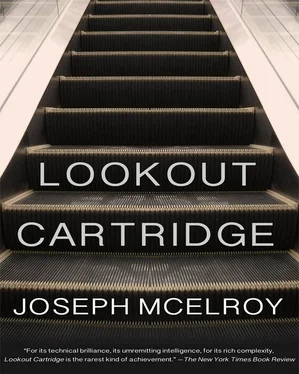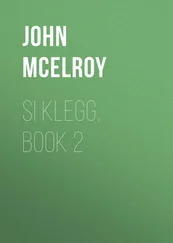Joseph McElroy - Lookout Cartridge
Здесь есть возможность читать онлайн «Joseph McElroy - Lookout Cartridge» весь текст электронной книги совершенно бесплатно (целиком полную версию без сокращений). В некоторых случаях можно слушать аудио, скачать через торрент в формате fb2 и присутствует краткое содержание. Год выпуска: 2014, ISBN: 2014, Издательство: Dzanc Books, Жанр: Современная проза, на английском языке. Описание произведения, (предисловие) а так же отзывы посетителей доступны на портале библиотеки ЛибКат.
- Название:Lookout Cartridge
- Автор:
- Издательство:Dzanc Books
- Жанр:
- Год:2014
- ISBN:9781941088036
- Рейтинг книги:3 / 5. Голосов: 1
-
Избранное:Добавить в избранное
- Отзывы:
-
Ваша оценка:
- 60
- 1
- 2
- 3
- 4
- 5
Lookout Cartridge: краткое содержание, описание и аннотация
Предлагаем к чтению аннотацию, описание, краткое содержание или предисловие (зависит от того, что написал сам автор книги «Lookout Cartridge»). Если вы не нашли необходимую информацию о книге — напишите в комментариях, мы постараемся отыскать её.
Lookout Cartridge — читать онлайн бесплатно полную книгу (весь текст) целиком
Ниже представлен текст книги, разбитый по страницам. Система сохранения места последней прочитанной страницы, позволяет с удобством читать онлайн бесплатно книгу «Lookout Cartridge», без необходимости каждый раз заново искать на чём Вы остановились. Поставьте закладку, и сможете в любой момент перейти на страницу, на которой закончили чтение.
Интервал:
Закладка:
I saw a Leica IIIG box but for $130, and after all, this was the same trip and I’d already brought Jenny something and she wasn’t in my good books anyhow.
If my suitcase hadn’t been stolen from Sub’s, and there was little reason to think it had been, I’d put Will’s stock exchange literature in it for safekeeping.
That had been a good half hour with Will yesterday on the floor of his room. I’d lost the weightless feeling now. The sun had spun a rainbow cartwheel in a flawed pane of Jenny’s window.
The slave-catcher’s last name was Clare.
I let myself into Sub’s and saw my suitcase standing in the hall; and the penny dropped.
I sidestepped a shopping basket full of laundry at the entrance to the kitchen and put in a call to London. I got Will and told him the Xerox address in Junction Road and asked if he’d use his money and not let Lorna know, and tell her I’d called to say everything was all right and to give my love. Will said nothing had happened, no one had broken in, Jenny had not come home, Lorna would be home soon.
I hung up and the coordinate truck engines and fire sirens in the sound grid of Manhattan weighed silently on the miles between me and Highgate till that distance dropped like some scope trace.
Where had Dagger stashed the sound tapes? And what about the reluctant 8-millimeter cartridge we’d shot the night we came back from shooting at the air base. I could simply ask. But on the other hand, by asking I might lose what I sought.
You may have to forget anything even on the brink of remembering everything.
Lorna my beloved in her bad period prior to Tessa forgot even me, perhaps me first.
Dudley Allott himself, the cool scholar backing across the Atlantic in one direction and then the other from period to period, said for his Catherwood work he sometimes felt that contrary to the laws of preparation and intellectual maturity, he had to forget ten thousand modern European histories for some unknown duration in order to find his object and its central American space: for he it was, with an Indian-head patch he’d sewn himself on the seat of his jeans, who lumbered around right field that softball Sunday and had his place in Dagger’s camera on a good sluggish bunt that he was too slow to beat out.
That game had been the first scene we shot, though Dagger (as I’ve explained) was for putting the Softball Game back between the Hawaiian-in-the-Underground and the Suitcase Slowly Packed, which if the film had survived would have left the Unplaced Room first with its second-hand Marx and third-hand combat experience.
Oh if the deserter’s lift from Trondheim fjord to the Faeroe Islands was a dilettante geologist looking out more for trout than rocks and caring still more for boats, what the devil was I with my smattering of music from plainsong to Charles Ives’s variations on “Washed in the Blood of the Lamb” picked up from Lorna, my guidebook Chartres from Will, Stonehenge from newspapers, even science from outside and inside, the outside often seeming to be little more than that hobby firm that up to now had paid me a few hundred pounds a year for little more than bearing messages.
I did a sinkful of dishes.
I strode abruptly to the living room threshold dripping detergent water. The pages left on Sub’s desk were gone.
On the other hand, Will had picked up a lot from me about computers, space, England, trains, Vietnam, and about women I dare say, not that he lacked instincts, but I could point out to him that Lorna found it hard to ask for help so we must offer it before she got upset and you could sometimes tell she was on the edge when she hummed a Brandenburg — or that Jenny often lost a good picture because once again she had to get out her lens brush and squeeze the blower bulb to get rid of that last foreign speck.
She asked for an electric pencil sharpener one year and I got her one through Dag.
I packed Will’s stock exchange literature and set the suitcase on the day bed.
I hadn’t thought to pick up some duty-free whiskey last night but it was less than a week between trips and I suddenly didn’t know the law. My charter associates on either side of the ocean seemed farther and farther away.
I went out and purchased for Tris and Ruby and Sub two small packs of magic markers and a bottle of Scotch.
There was a fresh TV in the living room, a small Sony portable.
I left a note in case Phil Aut called and for good measure my address and phone but not Monty Graf’s name.
I thought of an answer if Monty asked about the sound track.
However, if I’d known for sure about the sound, then I’d have been between Monty and Dagger. But right now I felt between. Like a lookout, my eye peeled for a sign from my people or a sound from the enemy.
Instinct this morning had been right. Bar the outside chance Graf was in with Aut, either Monty was in my way in my effort to get to Outer Film, or I was in his.
I set out again, couldn’t find a bus; I didn’t want to pay for a cab, though I didn’t really think I’d have to buy Lorna’s Blue all over again. I envisioned the map of Lower Manhattan, my destination a grid come adrift in slipped parallels sieving into some one of the drags funneling noise toward the tunnels and bridges, and against that map in my head I ticked off like a tourist my list of things that at this stage were not inevitable.
It was not inevitable I would run into the asbestos-watcher again to whom I’d given a dollar outside the record shop, or the touchy blind man, or Jim the stabber; it was not inevitable that Aut would phone, nor that my collaboration with the painter Jan Graf would get a rise; not inevitable that it meant anything my seeing my name on the panel truck just before the aerial stabbing; not inevitable Dagger would mention the sound track on his own without prompting, nor that I’d ever meet the schoolteacher who had lost his job in the Bahamas possibly through associating with Dagger and now lived in London or Paris, I forgot which. And not inevitable that Gilda would phone, nor that Jenny would come to the States, nor that Claire, newly bathed and happy, would be waiting with Monty Graf when I arrived, nor that Sub would be angry seeing the suitcase, or for that matter even care if I came or went. Not inevitable that the weightlessness I now felt again seeing my head in the window of an uptown Express bus would recur or have meaning.
But the Druid my sometime source says that in the current between lungs and shoulders, head and hand, breathing and pancreas — or one’s own breathing and that of others — the gate which a pulse finds open may then flip a whole future of gates; for the gods, to whom are proper certain provinces of possibility in the field of forces, know each other and know that Yes sometimes equals Yes and sometimes No, and my Druid agrees all this lore looks and is parallel to computer talk because in every age arise partial tongues that may do violence to some truth but that you learn to use to find the gods who themselves have given the tongues. Think but of the difference between the true (if flattened) globe we live in (says the Druid) and Gerardus Mercator’s plane grid on which regardless of the deformation of sphere into flat map Raleigh unlike Columbus could plot a straight-line course to the New and virgin World and know he had a line of constant compass-bearing.
Which, as my Druid may not have known, is a rhumb line— really not straight at all, a gentle loop from one point of the great circle you were following to another, but in practice a plottable and constant bearing the wheel-watch could hold till you ordered a change. Look at Mercator’s Greenland (said the Druid), it dwarfs your United States because the price of transformation is that as you move away from the Equator your scales change, latitude parallels widen, Greenland grows into a new space that both does and does not exist.
Читать дальшеИнтервал:
Закладка:
Похожие книги на «Lookout Cartridge»
Представляем Вашему вниманию похожие книги на «Lookout Cartridge» списком для выбора. Мы отобрали схожую по названию и смыслу литературу в надежде предоставить читателям больше вариантов отыскать новые, интересные, ещё непрочитанные произведения.
Обсуждение, отзывы о книге «Lookout Cartridge» и просто собственные мнения читателей. Оставьте ваши комментарии, напишите, что Вы думаете о произведении, его смысле или главных героях. Укажите что конкретно понравилось, а что нет, и почему Вы так считаете.












